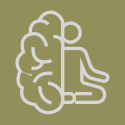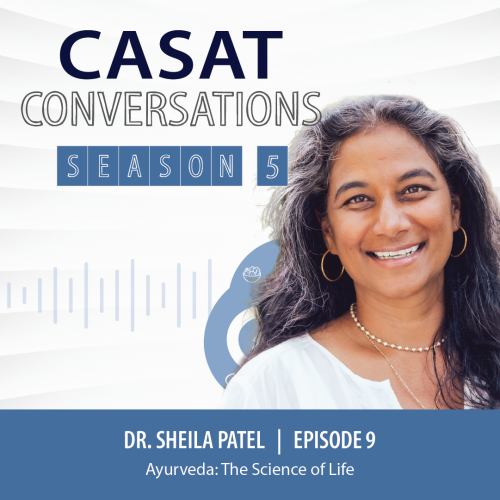The Healing System of Ayurveda
During my career in medicine, I had the opportunity to work in remote settings where we often had to fly people to larger medical centers for treatment. It was during these years that I began to recognize the power of our innate healing systems. There were times when giving the body some gentle support with medications until the patient could be transported, resulted in better outcomes than doing aggressive procedures. In fact, during my decades in medicine, we have shown over and over that ‘less is often more,’ and when simply supporting the body, it is actually quite resilient.
There are many tools and practices to cultivate resilience, and the healing system of Ayurveda gives us some of the most practical and effective tools. Ayurveda allows to self-regulate our nervous system through daily practices that calm and nourish the body. When the nervous system is calm, and the body feels nourished and safe, the internal environment is one of healing and restoring. Through accessing this innate healing system, we can prevent disease and thrive. As I learned more about Ayurveda, I realized that the principles can be incorporated into our modern context and used alongside modern medicine to maximize our healing ability.
Ayurveda is a traditional healing system that originated in India around 5000 years ago. It is very applicable to the modern world because it is based on the principles of nature, which haven’t changed over time. Ayurveda means “the science of life” and is a practical approach to creating a healthy lifestyle. This system teaches us that when we align our daily habits with our natural cycles, our physiology can work optimally. We can think of Ayurveda as the original lifestyle medicine, as most of the recommendations revolve around creating healthy lifestyle practices to enhance digestion and metabolism, create a healthy immune system, and optimize the body’s ability to heal. In doing so, we can prevent and even reverse disease. In addition, we can increase our well-being on a daily basis to reach our full potential for health and happiness.
Foundational Principles of Ayurveda:

Ayurveda is a holistic mind-body-spirit approach to health and well-being, giving us tools for thriving in all aspects of our life—physical, mental, emotional, and spiritual. Research shows us that when we address all these aspects of our lives, we maximize our overall well-being.

Ayurveda is whole-systems medicine, as it addresses the entire system and not just one part of the whole. While healing one part of the system, you also do things that keep the rest of the body and mind healthy.

Ayurveda teaches us to look for the root cause of disease and how to reverse the disease process by dealing with the factors that created the condition in the first place. One example of how Ayurvedic principles are being validated by modern science is that Ayurveda recognized that “most disease begins in the gut,” a concept we are just beginning to understand through exploration of the microbiome, as well as the intricate connection between the gut, the immune system, the neurological system, and the brain. Many Ayurvedic practices help to balance gut health, and by doing so, can treat the root cause of many issues.

Ayurveda recognizes that we are all different and that daily practices should be personalized for each individual and their unique mind-body type, or dosha. It is the original personalized medicine. This is also being confirmed by the modern concepts in genomics, which can identify individual variations in genes and gene expression, including tendencies toward certain diseases. Ayurveda teaches that certain mind-body types (doshas) have a tendency toward specific diseases; therefore, following certain daily practices can prevent those diseases. This supports our lived experience that health practices are not ‘one size fits all.’
Ayurvedic Practices:
Now let’s look at a few Ayurvedic practices and how they may help us stay healthy in body, mind, and spirit:
Moving the body: exercise has a beneficial influence on brain resilience and can induce positive physiological and psychological improvements, protect against the effects of stressful events, and prevent or minimize several neurological diseases. A core tenet in Ayurveda is “Movement is Life,” and recommends moving the body daily. Yoga as a movement practice provides additional benefits as it promotes self-regulation and resilience by regulating the autonomic nervous system.
Establishing a regular daily routine: Ayurveda recommends establishing a daily routine that aligns with the natural rhythms of day and night. Circadian rhythm researchers tell us that “body clocks” found in every cell of the body are vital to a properly functioning immune system. A synchronized daily rhythm makes our immune system resilient and works effectively. Conversely, when our organ’s functions are ‘desynchronized’ or not in a natural rhythm, our immune system may be less effective, thus making it harder for us to fight off infections. Ayurvedic recommendations for an optimal daily routine include eating regular meals with the largest meal in the middle of the day, not eating within 2-3 hours of bedtime, connecting to the sun and nature daily to sync our rhythms to the Earth’s rhythms, performing more vigorous activity in the late afternoon, and having a calming bedtime routine to induce natural sleep.
Doing regular self-massage: Ayurveda recommends using our senses for healing and performing self-massage. Massage is one of the best ways to create resilience in the nervous system. Through modulation of the nervous system, the sense of touch is a powerful tool to self-regulate and build resilience. Some studies show changes in the immune system and brain that support what people experience as far as improvements in both physical and emotional resilience.
Establishing healthy sleep: Ayurveda puts as much emphasis on good quality and quantity of sleep at night as it does on our activities during the day. Poor sleep has been associated with an increased risk of many chronic diseases in the body, as well as a worsening of anxiety and depression. Ayurveda has many tips to create restful, restorative, and natural sleep. Some Ayurvedic recommendations include performing regular self-massage at night to calm the nervous system, using calming aromatherapy such as lavender, sandalwood, or rose, taking a warm bath or shower in the evening, reducing intense activity in the evening, dimming the lights and doing some calming breathing right before bed. By establishing healthy, natural sleep, we create improved health in body and mind.
Meditating daily: A regular meditation practice affects our genetic expression and can ‘turn up’ genes related to health and ‘turn down’ genes that can lead to chronic disease. In addition, research is beginning to identify changes in specific areas of the brain that occur with regular meditation practice and how these changes can create improved physical and mental health.
Ayurveda offers us many practical tools to create health in our minds and bodies. By following an Ayurvedic lifestyle and incorporating simple Ayurvedic practices into our lives, we can not only prevent disease but create a physiology that allows us to thrive in our lives truly.
Ready to Learn More:
 Listen to Season 5 of CASAT Conversations. In episode 9, Dr. Sheila Patel shares more about how the holistic approach of Ayurveda aims to treat the entire individual, identifying the root causes of ailments and doing daily activities to promote balance. She shares how Ayurveda supports mental health and explains the connection between the mind and the body. Within the episode, she further explains the doshas and how if we understand our body’s makeup, we can make wiser decisions on how best to care for it.
Listen to Season 5 of CASAT Conversations. In episode 9, Dr. Sheila Patel shares more about how the holistic approach of Ayurveda aims to treat the entire individual, identifying the root causes of ailments and doing daily activities to promote balance. She shares how Ayurveda supports mental health and explains the connection between the mind and the body. Within the episode, she further explains the doshas and how if we understand our body’s makeup, we can make wiser decisions on how best to care for it.
Dr. Shiela Patel

Blog Post Tags:
Related Blog Posts
Related Learning Labs
Related Resources
.
- Buscar Tratamiento de Calidad para Trastornos de uso de Sustancia (Finding Quality Treatment for Substance Use Disorders Spanish Version)
- Finding Quality Treatment for Substance Use Disorders
- Focus On Prevention: Strategies and Programs to Prevent Substance Use
- Monthly Variation in Substance Use Initiation Among Full-Time College Students
- The National Survey on Drug Use and Health (NSDUH) Report: Monthly Variation in Substance Use Initiation Among Adolescents












We should be grateful for the effort to unite traditional methods of doing things with new knowledge. Due to my interest in holistic health, this site has made me want to learn more about Unani medicine. Fantastic work!
Labub Kabir Khas
A comprehensive approach to healthcare, unani medicine places a strong emphasis on the harmony of bodily functions as well as the balance of the four humors—blood, phlegm, yellow bile, and black bile. This method recognizes the connection between spiritual, mental, and bodily well-being. Natural cures like as animal products, minerals, and herbal medications are the foundation of unani medicine. To preserve their therapeutic qualities, these treatments are frequently made using certain formulas and procedures.
unani medicine
This post is extremely radiant. I really like this post. It is outstanding amongst other posts that I’ve read in quite a while. Much obliged for this better than average post. I truly value it!